Teen Forced To Take Care Of Her Family's Elderly Dog Questions Why She's The Bad Guy For Complaining About It
There are tons of videos on social media of parents surprising their children with the pet they have always wanted. The kids cry tears of joy and express how much they already love the pup or kitten.
What we don't see is the family meeting that probably happens once their phones are done recording. But I have a pretty good guess about what they talked about.
The parents have to make it clear that the puppy is now the responsibility of their kids. They have to take it on walks, feed it, and train it to be obedient.
The kids will either rise to the challenge or eventually give up on the puppy once the novelty wears off. Then, it's up to the parents to clean up after the family pet, and the regret settles in.
This 17-year-old's family used to have a dog of their own called Little Man. Unfortunately, they had to leave the dog with their grandfather when they moved to a different state.
Their grandfather died recently, and OP's mom, Sarah, decided they would take Little Man back, even if it meant moving to a state closer to him. She felt guilty because, since they left him, Little Man's life went downhill.
He is an old dog now, overweight, and suffering from fleas. Once they brought him home, his fleas also infected their new family cat, and Little Man can barely control his bladder.
They believe the dog has a condition that makes him constantly need to hydrate. Coupled with his weak bladder, Little Man pees on the floor a lot, and OP is left to clean the mess.
OP's mom does not help as much because she works long hours, and her brother David is barely home.

Since OP is the primary caretaker, Little Man has become attached to her and follows her to her room—this is where the dog pees a lot.
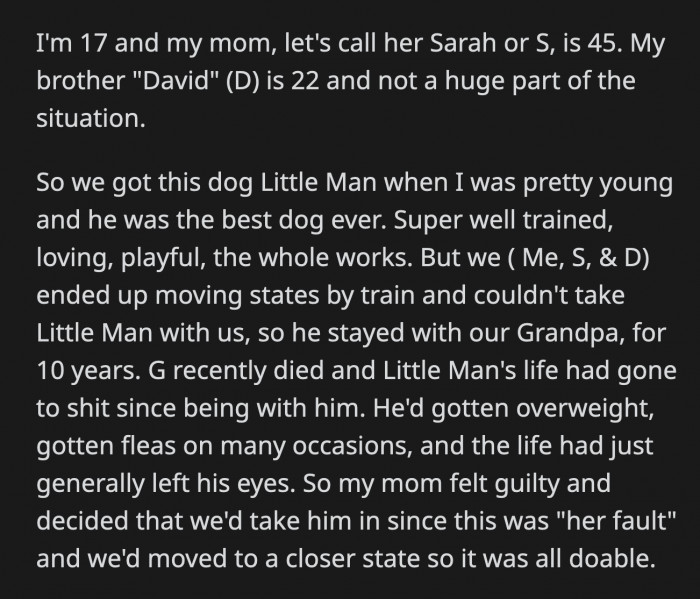
OP is getting exhausted from being the sole caretaker of an elderly, ailing dog who needs a lot of supervision.
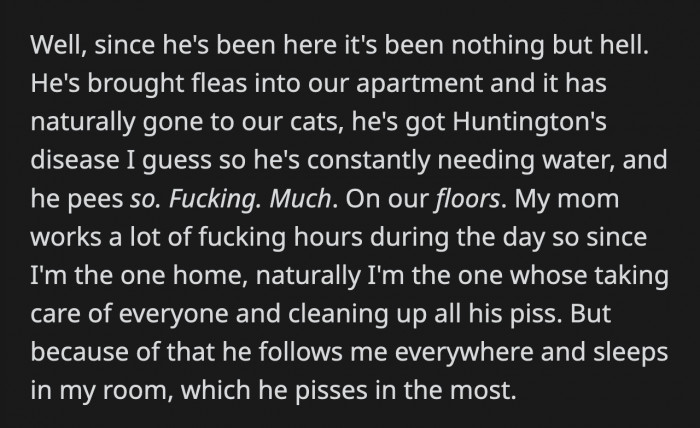
Understanding the Emotional Impact of Loss
Dr. Sarah Thompson, a clinical psychologist specializing in grief, highlights that taking care of an elderly pet after losing its owner can evoke complex feelings, including guilt and resentment.
Her research indicates that individuals often feel compelled to step into caretaking roles out of a sense of duty, especially when guilt is a factor.
This can lead to internal conflict, as the caretaker may feel burdened while simultaneously wanting to honor the memory of the deceased pet owner.
Coping with Grief in Pets
The recent loss of an owner can be traumatic for pets, especially for a dog that has spent a decade with one person. According to research published in the Journal of Veterinary Behavior, dogs can experience grief, which may manifest as anxiety, depression, or behavioral changes.
This emotional turmoil can not only affect the pet but also those who take on the responsibility of caring for them. The pressure to provide care under such circumstances can lead to feelings of resentment and guilt in caregivers, particularly when they feel unprepared or unsupported.
OP complained to her mom about it, but she said OP has to do the cleaning because she won't injure her back from bending down a lot.
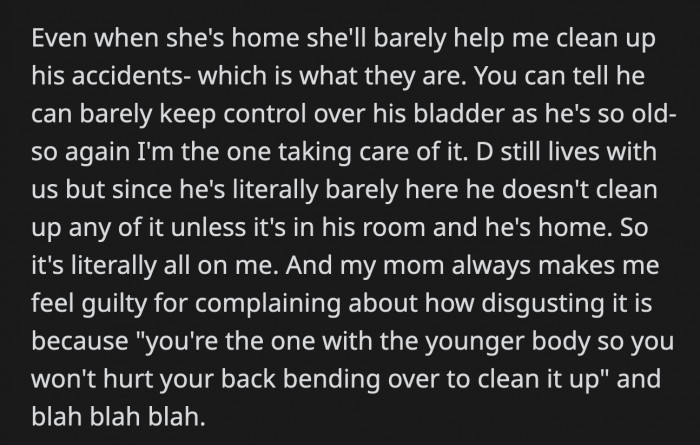
OP feels like her frustration is being dismissed too quickly and her feelings invalidated. Is she wrong for being tired of being the dog's primary caretaker?
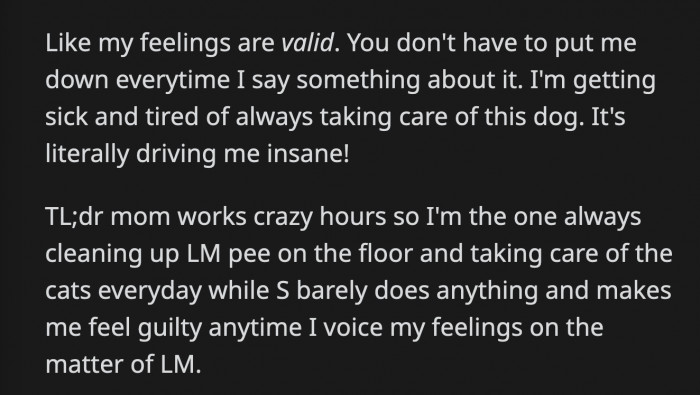
A former vet assistant replied to OP, stating that it is more likely that Little Man is diabetic and not suffering from Huntington's disease, which dogs cannot be afflicted with.
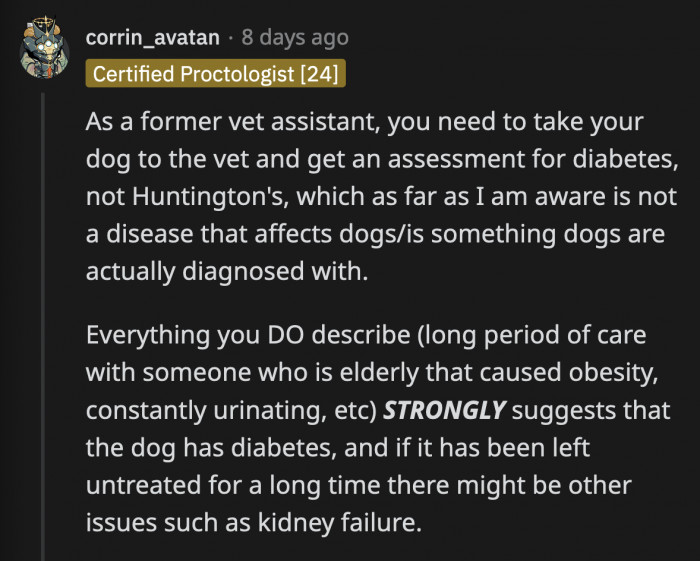
Behavioral observations suggest that emotional labor, particularly in caregiving situations, can significantly impact mental health.
Research published in the Journal of Applied Psychology shows that unrecognized emotional labor often leads to burnout and feelings of inadequacy in caretakers.
Thus, it's essential for the teen to acknowledge her feelings rather than suppress them to maintain her emotional well-being.
When discussing the psychological implications of guilt, it’s important to recognize the role of social expectations in caregiving. Research indicates that those who feel obligated to take care of others, such as family pets in this case, may experience caregiver burnout, a state of emotional, physical, and mental exhaustion.
This can lead to significant stress and conflict within family dynamics, as one individual may feel overburdened while others do not share the same sense of responsibility.
The family needs to take the dog to the vet to get a health check to confirm what he has so they can manage it.
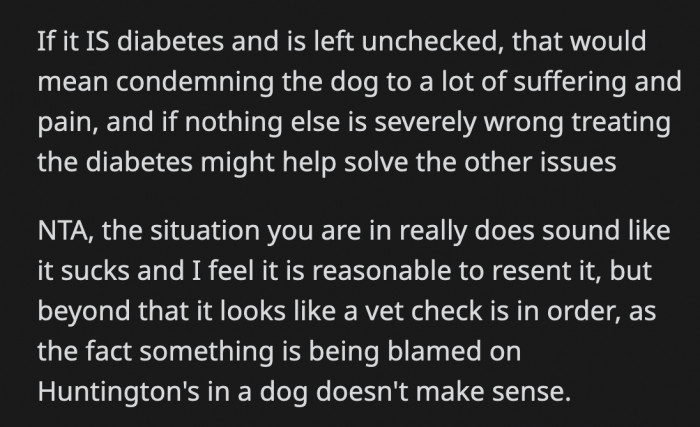
The easiest solution is to get diapers for Little Man, but he badly needs to see a doctor.

OP said they tried puppy pads, but they didn't work; their next option is to try diapers.

Strategies for Healthy Emotional Expression
Experts recommend journaling as a powerful tool for processing complex emotions related to caregiving.
According to Dr. James Pennebaker, writing about emotional experiences can lead to improved psychological and physical health by helping individuals clarify their feelings.
Additionally, sharing her feelings with supportive friends or a therapist can help the teen navigate her conflicting emotions more effectively.
The Emotional Impact of Pet Ownership
Pet ownership is often associated with numerous psychological benefits, including companionship and emotional support. However, it can also create complex emotional burdens, especially when the pet is grieving.
Studies show that while pets provide comfort, they can also intensify feelings of grief and responsibility for their caregivers. This paradox can lead to significant inner conflict, especially when one feels torn between their own emotional needs and the perceived needs of the pet.
One commenter said OP needs to suck it up, and while she may be stuck caring for the dog 24/7, she owes it to him. They chose to have this dog, and with that comes the responsibility to take care of him his whole life, especially when he is this old.

The comments were divided, but someone pointed out that everyone except the dog sucks. They knew his condition when they brought him home, and it was their responsibility to make him comfortable and secure the safety of their other pet. All of them need to step up and show Little Man how much they love him for however long he's got left.
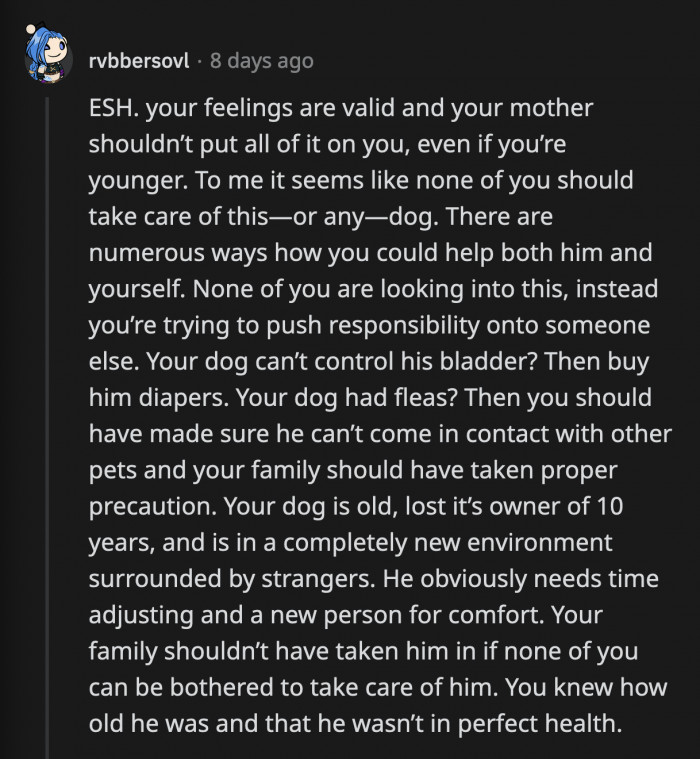
If they cannot give the attention and care that the dog needs, they have to rehome him with someone who can take care of him and not resent him for it.
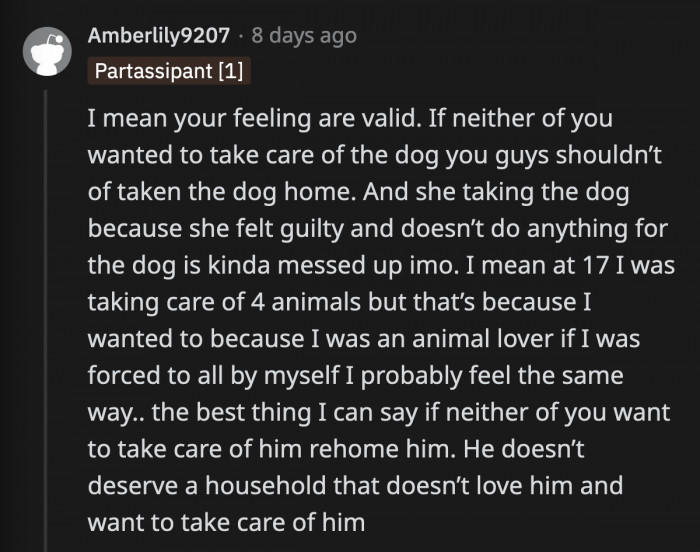
It's important to understand that feeling overwhelmed in this situation is a normal reaction.
Research indicates that adolescents often struggle with emotional regulation, especially when faced with responsibilities that feel disproportionate to their age.
Encouraging open conversations about her experiences can foster emotional resilience and help her articulate her needs more clearly.
To address these challenges, it’s crucial for caregivers to establish boundaries and seek support. Engaging in open conversations with family members about feelings and expectations can help alleviate some of the emotional strain. Additionally, Elizabeth Gilbert, author and speaker, emphasizes that “self-care is not selfish; it is essential,” highlighting the importance of self-care practices, such as mindfulness and stress management techniques, to help caregivers navigate their own emotional responses while supporting their pets.
OP says they do love him, but it's upsetting that she's the one in charge of everything concerning the dog.

The poor dog lost the person who cared for him for ten years. His new-ish family brought him home out of guilt but resents him for his failing health.
Little Man deserves so much more than pity and half-hearted attention. OP and her family must wake up and realize how badly they are failing this dog in his final days.
Understanding Family Dynamics in Caregiving
This situation underscores the importance of family dynamics in caregiving roles. According to a study from the Journal of Family Psychology, family members often develop unspoken rules about who should take care of what, which can lead to misunderstandings and conflict.
When one member feels obligated to take on a caregiving role, it can create tension and resentment, particularly if others are not equally involved or supportive. Involving all family members in discussions about care responsibilities may foster a more collaborative environment.
Psychological Analysis
From a psychological perspective, the feelings of guilt expressed by this teen reflect common stressors associated with unexpected caregiving roles. It’s essential to recognize that while the desire to help is commendable, it's equally important to prioritize one's emotional health to prevent burnout and resentment.
Encouraging open communication within the family about feelings and responsibilities can create a more supportive atmosphere, ultimately benefiting both the caregiver and the pet.
Analysis generated by AI
Analysis & Alternative Approaches
Research from multiple institutions supports these behavioral interpretations, with studies consistently showing the profound impact of grief on both pets and their caregivers.
Understanding the emotional complexities in caregiving situations can lead to healthier family dynamics. As psychological studies demonstrate, acknowledging and addressing these emotions is crucial for the well-being of both the caregiver and the pet.
Analysis & Alternative Approaches
In summary, the emotional complexity of this situation is significant, and feelings of guilt or resentment are common among caretakers.
Professional insights suggest that acknowledging these feelings rather than dismissing them is key to emotional health.
As Dr. Thompson emphasizes, open dialogue and emotional expression are crucial steps toward finding balance in caregiving roles.



